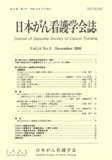Japanese
English
- 販売していません
- Abstract 文献概要
- 参考文献 Reference
- サイト内被引用 Cited by
要旨
本研究の目的は,痛み体験をもつがん患者に対してエキスパートナースが行っている看護実践を分析し,そこに内在する実践知を,Carperの4つの知のパターンとの関係で明らかにすることである.6名のエキスパートナースが行った疼痛緩和ケアの参加観察と面接を行い,その実践内容を分析した.エキスパートの疼痛緩和ケアの実践から抽出された15の実践知のパターンは,Carperの4つの知,すなわち経験知,審美知,自己知,倫理知に分類されると同時に,重なりあい,実践の中に統合されていることが明らかとなった.
本研究の結果から,がん患者の疼痛緩和ケアにおけるエキスパートの実践の卓越性には,直感,エキスパート自身への気づきや倫理的側面への感受性など,Carperの言う審美知,自己知,倫理知のパターンが深く関わっていることが見出された.優れた看護実践のためには,経験知だけでなく,それ以外の知のパターンも重要であり,4つの知のパターンすべてが磨かれることの必要性が示唆された.
Abstract
The purpose of this study is to analyze the practical nursing care for the patients with cancer pain performed by the expert nurses, and to identify a relation between the intrinsic practical knowing and four patterns of Carper's knowing. Pain relieving care performed by six expert nurses was studied by perticipant observations and interviews to analyze their practice. It was known that 15 patterns of the practical knowing extracted from the pain relieving care performed by the expert nurses, were classified into four patterns of Carper's knowing, i.e. empirical-, aesthetic-, personal-, ethical knowing, respectively. Simultaneously, they were overlapping and integrated into the practical knowing.
The result of this study revealed that the superior practice of the experts in pain relieving care for the patients with cancer was deeply related to the intuition, knowing on an expert oneself, and sensibility to ethical topics ; it means so-called Carper's patterns of aesthetic-, personal-, and ethical knowing respectively. It was suggested that for excellent practice of the nursing care, not only the empirical knowing but also other patterns of knowing are important, and it is necessary to sense up all four knowing patterns.
Copyright © 2000, Japanese Society of Cancer Nursing All rights reserved.


